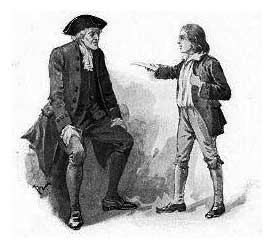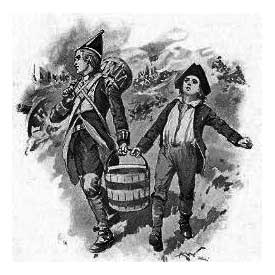Chapter 8 | A Young Hero
“I wish all this fighting would finish, Dr Martin,” said Phil one day, with a sigh. “It seems very dreadful, and my father is always away. But,” he added, “it’s very nice being near him.”
“In the midst of all this horrible excitement?”
“Yes; I don’t mind that much, only seeing the poor men brought here wounded. I say, how they like me to go and talk to them when their wounds have been tied up! Look here!”
“What have you got there?” said the Doctor, as the boy pulled something from his breast.
“Letter,” said Phil, shortly. “This makes six I’m to take care of and send when we go away.”
“Six letters?”
“Yes; they’re only written with pencil, and I don’t remember the men now who gave them to me, but they were all wounded, and they said I was to send them home.”
“Poor fellows,” said the Doctor, with a sigh.
“Yes,” said Phil. “I mean to show them to father some day and ask him to help me to send them. Ah! Here he is!”
For at that minute the Major hurried into the tent.
“Just to say good-bye to you, Phil, my boy.”
“Oh, father,” cried the little fellow, with his face clouding over; “don’t go away and leave me! You’re always saying good-bye.”
“Phil!” sternly.
“I forgot,” cried the boy. “Yes. I know. You’re going on duty. But you’ll not be long, father?”

“Not a minute longer than I can help, my boy. Now go. I want to speak to Dr Martin.”
“Yes, father,” and Phil ran to the opening of the tent door.
“You are not hurt?” cried Dr Martin, anxiously.
“Not even scratched, Doctor, but the great moment is near, and I was obliged to see my boy once more. I dare not send you both away, for it would only be into the hands of the enemy—perhaps amongst their savage camp followers. You have given up practising for years, but you are a certificated physician and surgeon, and the doctors here will receive you and my boy, glad of your help. While if matters go wrong with the General in a desperate venture, you will be where the wounded are being collected, and the French will respect you.”
“Yes,” said the Doctor. “Then you wish me to join the field hospital—when?”
“As soon as I am gone. You understand?”
“Yes. You may trust me.”
“I know that. Heaven protect you both. Now I can feel at rest. Phil!”
The boy dashed back, to spring upon his knee.
“Now, quick, my boy,” cried the Major, kissing him. “Say good-bye like a soldier’s son.”
“Yes, father; but when—”
“Phil!”
“I know, father,” cried the boy, hastily drawing himself up. “Good-bye. So glad to see you back.”
“I know, my boy. There, we’ve kissed as women do; now shake hands like a man.”
Father and son stood for a few moments hand clasped in hand, and then without trusting himself to look back, the Major walked quickly through the tent door, just as a heavy boom announced that a fresh attack was near.
“Gone!” cried Phil, with a piteous cry and outstretched hands, but the next moment he drew himself up stiffly and marched to the Doctor’s side.
“Bravely done, my boy,” cried the old man, patting his shoulder. “Now then, your cap.”
“We’re not going away?” cried Phil, in dismay.
“Yes, directly.”
“But father won’t know where to find us again.”
“Yes, he will, for he says we are to join the doctors with the wounded men.”
“Then he will know? Yes, I shall like that. They are always so thirsty. May I take them some water to drink?”
“Indeed you shall, Phil.”
Their journey was not long, but it was difficult, for the little army was advancing, and the old Doctor and his pupil were hardly settled in their new canvas and waggon quarters before the attack was in full progress and the bearers were coming in with the wounded, the dying, and, those whom the doctors pronounced already dead.
It was a terrible time—hours of horror, during which, heedless of the roar of cannon and the crash of musketry, the busy surgeons toiled on, till the lines of bandaged sufferers lay increasing fast in the one calm, comparatively silent spot at the back of the fortifications that were being attacked.
There was a tent or two as well where the surgeons worked at their terrible task, and it happened towards the height of the terrible conflict, when the British soldiers were struggling and gaining their way step by step, every foot being desperately contested by the brave army of the French General Montcalm, that Phil was busy in a wide sheltered spot beneath the enemy’s lines, tin cup in one hand, holding on to the iron handle of a bucket with the other, the bucket pretty full of water, and swinging between him and a drummer boy.

Those two went steadily on, to stop whenever a beseeching face was turned to them. Then the pail was set down, Phil dipped the cup and went down on one knee to hold it to some poor sufferer’s lips, always receiving for his thanks the reverently uttered words, “God bless you, boy.”
The blessings called down upon the little fellow’s head came in hundreds that day, in English and in French, and somehow in the excitement Phil, after the first few minutes, never saw the horrors by which he was surrounded; but the boy noted only that hands were raised to him for water, and he and the drummer filled and emptied that swinging bucket again and again.
It was during the height of the attack upon the fortifications that the bearers carried one who seemed to be an officer inside the surgeon’s tent, and he was not carried out again, but laid up on a roughly-folded waggon-cloth, suffering and patient, for the surgeons could do no more. And from time to time an officer rushed up, to enter the tent, say a few words, receive a reply, and rush out again to hurry away into the smoke where the soldiers were still fighting on.
It happened, too, that with the bucket freshly filled from the water-cart, Phil and his comrade had just reached the end of a line of wounded men when one of the doctors came to the door of the tent, saw them and shouted:
“Here, boys! Water!”
They trotted up together, entered the tent, and the next minute Phil was down on one knee holding the cup to the wounded officer’s lips, while he drank with avidity, draining the cup, and sighing deeply as he noted how young was the face of his attendant waiting to give him more.
“Brave boy,” he said, gently, and he laid his hand upon Phil’s arm; “but this is no place for you.”
At that moment the roar of battle outside seemed to roll towards the place where the wounded man lay, increasing to a wild burst of cheers.
A flash of excitement darted from the officer’s eyes, and he tried to rise upon one arm.
“What’s that?” he cried.
“They run! They run!” came in answer from many throats.
“Who run?” panted the wounded man.
“The French, sir,” shouted an officer, hoarsely, as he dashed up to the wounded one’s side.

“I thank God, and die contented,” history says the General sighed.
It was then that Phil, who had stood unnoticed by the bearer of the victorious news, now kneeling by his great leader’s side, pressed forward to touch his arm, making him start round and cry in his astonishment:
“Phil, my boy! You here!”
For he realised that it was his little son who had just raised the water cup to the dying lips of the British hero—General Wolfe.
As for Phil Carleton’s career, little need be said, for the war was over with the defeat of the French, and in a few weeks he and Dr Martin were in the same ship with the Major and his regiment, homeward bound.

